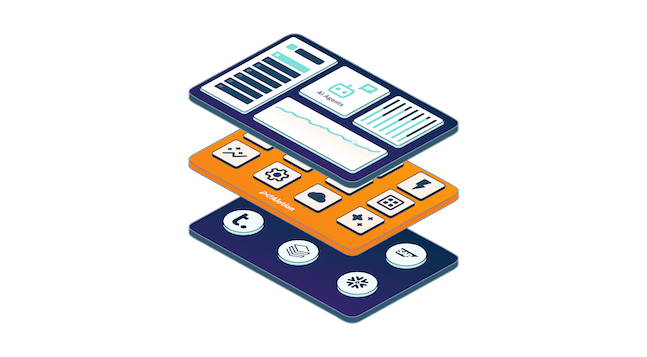Get Started with the Alation AI Agent SDK

By Robb Gibson
Published on May 28, 2025

What if your AI agents could recommend certified data assets with the confidence of a seasoned analyst? What if they could interface with the full spectrum of your data estate (multiple data sources, dispersed data locations, varied data types), communicate which assets are trusted, and explain business terms—on demand? If you're building with LLMs or developing internal copilots, you already know the challenge: AI is powerful, but without context, it guesses. And guessing isn't good enough for enterprise use.
The Alation AI Agent SDK gives AI developers, builders, and business users the tools to realize this vision. It connects your agents to Alation’s governed metadata so they can retrieve relevant, reliable, and real-time insights across your data estate. Whether you’re building with Anthropic's Model Context Protocol (MCP) or LangChain, this SDK plugs into your framework of choice and enables you to access the wide range of Alation connectors to reach all of your cloud and on-prem data sources.
So, how might you use AI agents produced with this SDK? To answer questions for people or applications, like:
“How can I join customer demographics data with customer purchase data to better understand demographic preferences?”
“What certified tables contribute to our customer retention model?”
“How is the Cost of Goods Sold (COGS) metric defined? And how do I analyze COGS by product line?”
These are the kinds of questions your agents can answer—instantly and reliably—when powered by Alation's metadata foundation.
What is the Alation AI Agent SDK?
The Alation AI Agent SDK is a toolkit for AI development teams to easily build agents that interact with Alation. The toolkit connects AI applications directly to the governed metadata and institutional knowledge in your Alation catalog. With this powerful context, the SDK helps teams reduce hallucinations, deliver accurate results, and shrink development time—while giving developers the flexibility to work within their preferred AI stack.
The SDK works seamlessly with popular AI frameworks like LangChain and MCP, allowing developers to use the tools they already know and trust. Multi-framework support reduces friction for AI teams and increases agility as technologies evolve.
For AI developers, this means faster development, cleaner integrations, and the freedom to avoid vendor lock-in. For business users, it means agents that work reliably across systems, pull from the most trusted data sources, and generate insights with context—not guesswork.
What’s in the toolkit?
AI Agent SDK: Build with speed and trust
The kit includes everything developers need to get started quickly and scale with confidence:
Developer-friendly tools: Including the Alation Aggregated Context tool to simplify setup and reduce complexity.
Enterprise-ready resources: Comes with comprehensive documentation to accelerate deployment and ensure success in production environments. Check out the examples and the guides.
Compatible with leading AI frameworks: Seamlessly integrates with Anthropic’s MCP standard and LangChain.
Aggregated Context Tool: Inject trusted metadata into any agent
The Alation Context tool retrieves contextual information from the Alation catalog based on natural language queries.
Unlock faster, more confident decision-making. By making trusted knowledge easily accessible in natural language, teams can quickly find accurate answers (no technical skills required). This means less time spent hunting for data and more time acting on reliable insights.
Break down data silos and get a complete picture in one place. Comprehensive metadata coverage ensures users can pull together diverse data assets—like tables, docs, glossary terms, queries—into a single view, supporting analysis and understanding.
Find exactly what you need, no noise, no clutter. Our new Signatures feature makes it easy to zoom in on just the portion of your data estate that you want. With precision filtering, Signatures lets users instantly zero in on the most relevant, trustworthy information—whether it’s for specific business units, certified datasets, or compliance-focused fields—reducing risk and boosting productivity.
Real-world use cases in action
Organizations can use the AI Agent SDK today to build high-impact, trusted agents. Here are just a few examples of how it can be used:
Search & discovery assistant
Launch a virtual assistant that helps employees find the right data assets to make faster, confident decisions using natural language. By tapping into Alation’s metadata, the assistant can return certified sources, clear definitions, and direct links, dramatically reducing the time to find and use data.
Example questions include:
What were our top-selling products last quarter by region?
How is Customer Lifetime Value (CLV) measured?
Where can I find product returns by region?
Analyst agent
Enhance natural language-to-SQL generation by providing metadata from Alation, such as common joins, filters, and top-used columns. Alation can help across the lifecycle in identifying relevant published queries, providing inputs like common joins to create queries, and validating inputs to queries.
Example questions include:
How do I join the customer and transaction tables?
What filters can I use with the customer segmentation table?
What query should I use to analyze sales by region?
Role-based agents
Create specialized agents using Signatures. For example, create different agents by domain: one for the marketing team, one for the finance team, and another for the sales team. Each agent accesses only domain-specific terms and assets, ensuring that responses are secure, relevant, and free from cross-domain confusion.
Example questions with different role-based agents include:
Marketing Agent: What is Customer Acquisition Cost (CAC), and how is it calculated?
Finance Agent: What query should I use to analyze claims from last quarter?
Sales Agent: Where can I find new sales by region by product line?
Governance-aware AI agents
Create agents that only access high-quality, well-governed, and compliant data assets. For example, use Signatures to define that only “gold-layer” assets (for customers using a Medallion architecture) are to be used. This ensures AI applications are aligned with enterprise governance and quality policies, reducing risk and increasing user trust.
Users can query gold-layer assets with the same types of questions as above, but restricted to only assets meeting that criteria. Questions like:
Where can I find product returns by region?
How do I join the customer and transaction tables?
Where can I find new sales by region by product line?
These are just a few examples of what is possible.
With the AI Agent SDK, you’re not just building smarter AI—you’re operationalizing enterprise intelligence. It’s time to move beyond experimentation and start building agents that truly understand your business.
Get started
How to build your first trusted agent
Now that you’ve seen what’s possible with the AI Agent SDK and Aggregated Context tool, let’s walk through how to build a metadata-aware agent—step by step.
Install the SDK: Use your preferred framework, like MCP or LangChain.
Connect to your catalog: Configure your Alation instance and enable the Aggregated Context API. Not in beta? Request access.
Build your Agent: In your preferred framework, build your agent. Depending on the details of the framework, this may include adding instructions for the agent, giving it a name and description, selecting the tools you want to use (including Alation), and picking a model and configuring its settings.
Test a real question: Ask a question in natural language.
Refine with Signatures (optional): Filter by domain, trust flags, tags, or custom fields. You can also detail which fields are required and which are optional to further refine responses.
Deploy and scale: Integrate into workflows, connect with downstream tools, and add agents into broader systems.
The result? Faster development, better answers, and agents that truly understand your business—no matter where your data lives.
Ready to start building? Let your AI agents do more—with trusted context.
Sign up for the beta program and start building metadata-aware agents today.
Review the Aggregated Context API Guide and Signature Guide on the Alation developer portal to dive deeper
- What is the Alation AI Agent SDK?
- What’s in the toolkit?
- Real-world use cases in action
- Get started
Contents
Tagged with
Loading...